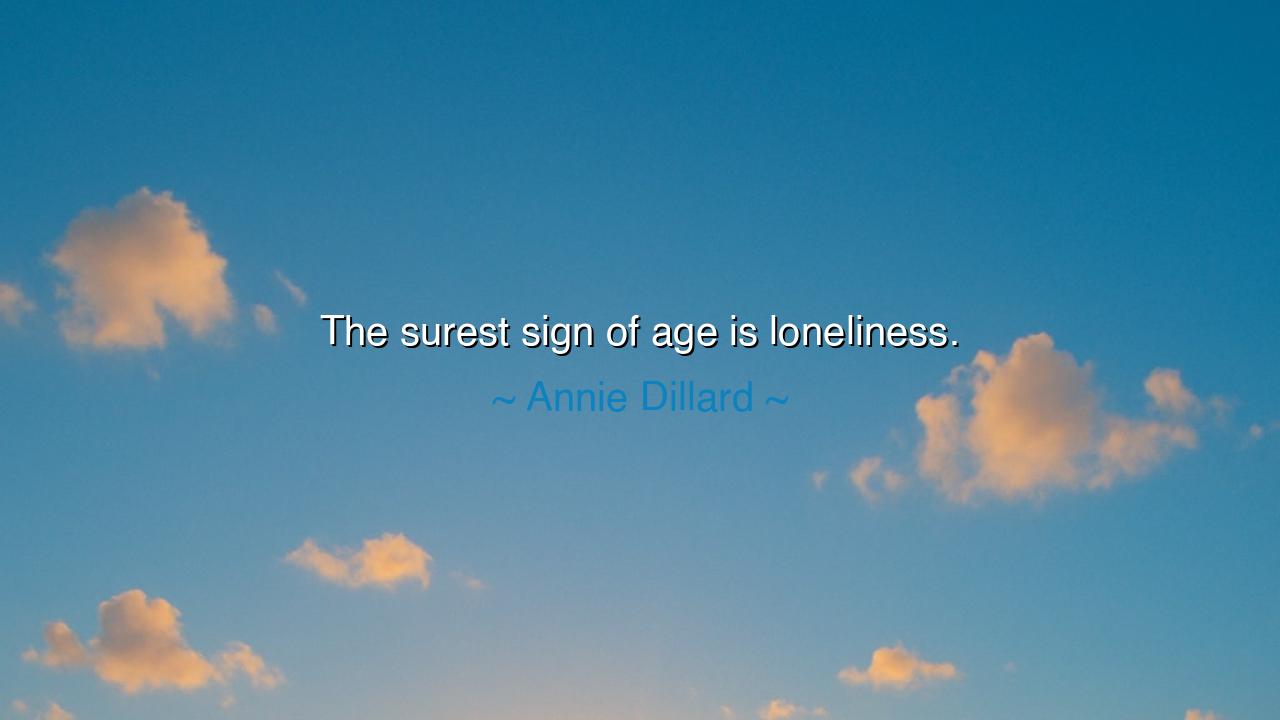
The surest sign of age is loneliness.






"The surest sign of age is loneliness." These poignant words by Annie Dillard speak to the profound truth that as the years pass, we are not only marked by the physical changes that come with aging, but also by the empty spaces left in our lives as those we love pass on, or as our circle of friends and companions shrinks. Dillard, with her keen insight into the human experience, draws our attention to the emotional cost of aging—the slow, inevitable drift of time that can lead us to a place where loneliness becomes the most telling sign of the years we have lived. This loneliness is not merely a feeling, but a condition—a symbol of the separation between ourselves and the world, a reminder of the fragility of life and the fleeting nature of human connection.
In the early stages of life, we are surrounded by people—family, friends, and loved ones who provide us with the warmth of community. The energy of youth is often shared in the company of others, as we explore the world together and build connections that are fierce and formidable. But as time goes on, people move away, relationships shift, and the once vibrant web of connections begins to unravel. This natural course of life, while inevitable, carries with it a deep emotional toll. As Dillard suggests, loneliness becomes the most palpable sign of the passing of years, for it is in the later stages of life that we come face to face with the truth that many of those we once held dear are now gone, and those left behind may not provide the same deep, sustaining connection.
Consider the story of King Lear, Shakespeare's tragic monarch, whose life is defined not just by the loss of his kingdom, but by the loneliness he feels in his later years. After he divides his kingdom among his daughters, Lear finds himself abandoned by those he loved and trusted, and his loneliness becomes his greatest torment. As his mind unravels and his strength fades, Lear is faced with the heartbreaking realization that, though he once had a powerful kingdom and many loyal subjects, he now has only despair and isolation. His loneliness is not just a consequence of age, but a profound symbol of the distance between his past and present, a reminder that time has stripped him of the companionship he once enjoyed.
Another poignant example is the life of Mahatma Gandhi in his later years. Though surrounded by many, Gandhi often spoke of his inner loneliness, a result of the immense responsibility he bore as a leader of his nation. Despite his many followers, Gandhi found himself in a state of seclusion and detachment, where the burden of leadership and the weight of sacrifice left him feeling emotionally distanced from those around him. His loneliness was not the absence of physical presence, but the psychological isolation that often comes with great responsibility and moral sacrifice. It serves as a reminder that loneliness can strike even the most revered figures at the pinnacle of their success.
Dillard’s quote speaks not only to the physical act of being alone but to the emotional state of separation that often accompanies old age. Loneliness is the quiet companion of many elderly individuals, a presence that is sometimes ignored or minimized, but which remains deeply felt. This loneliness, however, is not simply the result of physical absence, but the result of memory—the absence of past companions and the fading of vibrant connections. It is the reminiscence of a time when we were known, when we were part of a community, and when the world seemed full of potential and companionship. In old age, we often realize that the circle of our lives has contracted, and we are left to face the emptiness of time without the same companions of our younger years.
The lesson of Dillard’s quote is that loneliness, though it can be a natural part of aging, should never be accepted as an inevitable or permanent condition. While it is true that the years may bring loss, they also offer the opportunity for new connections. Community, though it may shift in form, can still be found. In fact, Dillard's words urge us to value relationships deeply and to never take for granted the companionship we have, for in youth, we are often surrounded by people, but as we age, the effort to maintain those connections becomes even more essential.
In practical terms, we can combat loneliness by staying engaged with the world, by seeking out new relationships and nurturing old ones. It is never too late to form bonds with those who share our interests, whether through family, friendships, or even volunteering. Let us cherish the connections we have, for in a world where time moves relentlessly forward, it is these relationships that sustain us. The absence of loneliness is found not in the absence of others but in the depth of the bonds we create with those who are part of our lives. Age may take many things from us, but it is the companionship we nurture that keeps the soul vibrant and connected to the world around us.






AAdministratorAdministrator
Welcome, honored guests. Please leave a comment, we will respond soon